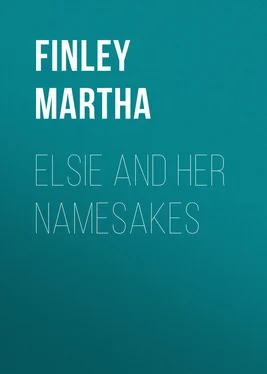Martha Finley - Elsie and Her Namesakes
Здесь есть возможность читать онлайн «Martha Finley - Elsie and Her Namesakes» — ознакомительный отрывок электронной книги совершенно бесплатно, а после прочтения отрывка купить полную версию. В некоторых случаях можно слушать аудио, скачать через торрент в формате fb2 и присутствует краткое содержание. Жанр: foreign_religion, Религиозная литература, foreign_antique, foreign_prose, на английском языке. Описание произведения, (предисловие) а так же отзывы посетителей доступны на портале библиотеки ЛибКат.
- Название:Elsie and Her Namesakes
- Автор:
- Жанр:
- Год:неизвестен
- ISBN:нет данных
- Рейтинг книги:4 / 5. Голосов: 1
-
Избранное:Добавить в избранное
- Отзывы:
-
Ваша оценка:
- 80
- 1
- 2
- 3
- 4
- 5
Elsie and Her Namesakes: краткое содержание, описание и аннотация
Предлагаем к чтению аннотацию, описание, краткое содержание или предисловие (зависит от того, что написал сам автор книги «Elsie and Her Namesakes»). Если вы не нашли необходимую информацию о книге — напишите в комментариях, мы постараемся отыскать её.
Elsie and Her Namesakes — читать онлайн ознакомительный отрывок
Ниже представлен текст книги, разбитый по страницам. Система сохранения места последней прочитанной страницы, позволяет с удобством читать онлайн бесплатно книгу «Elsie and Her Namesakes», без необходимости каждый раз заново искать на чём Вы остановились. Поставьте закладку, и сможете в любой момент перейти на страницу, на которой закончили чтение.
Интервал:
Закладка:
"I don't wonder," sighed Elsie softly, "for how he must have wanted to be at home with his wife and children."
Harold and Grace, who had been taking their morning exercise upon the deck, returned to the saloon and joined the group of listeners just in time to hear their mother's story of Nast's Christmas pictures.
"Nast certainly did a great deal for the Union cause," said Harold. "Do you remember, mother, what Grant said of him when asked, 'Who is the greatest single figure in civil life developed by the Civil War?'"
"Yes. He answered without hesitation, 'Thomas Nast. He did as much as any one man to bring the war to an end.' And many of the Northern generals and statesmen held the same opinion."
"Yes, mother; and all lovers of the Union certainly owe him a debt of gratitude."
"Now, children, shall I tell you something about Lincoln?" she asked. There was an eager assent, and she went on. "He was a noble, unselfish, Christian man; came to the Presidency in a dark and stormy time; did all in his power to avert civil war without allowing the destruction of the Union, denying the right of any State or number of States to go out of the Union. But the rebellious States would not listen, declared themselves out of the Union, began seizing government property, firing upon those who had it in charge, and Lincoln was compelled to call out troops for its defence.
"But I shall not go over the whole sad story now. After four years, when it was all over, every loyal heart was full of joy and Lincoln's praise was on every tongue. They felt that he had saved his country and theirs, and that at the expense of great suffering to himself. But only a few days later he was fatally shot by a bad fellow, an actor named John Wilkes Booth."
"One of the Confederates, grandma?" asked Ned.
"I think not," she replied. "It is said that his controlling motive for the dreadful deed was insane conceit. That for weeks beforehand he had declared his purpose to do something that would make his name ring round the world."
"As it has," remarked Harold; "but in such a way as I should think no sane man would desire for his."
"And did they hang him?" asked Ned.
"No," replied his uncle; "the awful crime was so sudden and unexpected that for several minutes the audience did not comprehend what had been done, and the assassin escaped for the time. He ran out, leaped upon a saddled horse kept waiting for him and galloped away into the country. He rode into Maryland, from there into Virginia, and took refuge in a barn. He was pursued, cavalry surrounded the barn, and called upon him and his companion to surrender. The other man did, but Booth refused and offered to fight the captain and all his men; then they set the barn on fire, and one of them, against orders, shot Booth in the neck. That shot made him helpless. He was carried out, laid on the grass, and after four hours of intense agony he died."
"That was a sad, sad time," sighed Mrs. Travilla. "The whole North was in mourning for Lincoln, and even the South soon saw that it had lost its truest and best friend; and there was a movement of sympathy for our nation in its great loss throughout the world."
"Yes, mother," said Harold; "and time only increases the esteem of the world for that great and good man."
CHAPTER V
The next day, after some healthful exercise upon the deck, the children returned to the saloon, and gathering about Grandma Elsie, begged for another story.
"Something historical?" she asked with her pleasant smile.
"Yes, grandma, if you please," replied Elsie. "I liked your story of Marion so much, and should be glad to hear about some other Revolutionary soldier who helped to drive away the British."
"Well, if you would all like that, I will tell you of Sergeant Jasper and his brave doings."
The other children gave an eager assent, and Mrs. Travilla began.
"History tells us that William Jasper was born in South Carolina in 1750. That would make him about twenty-six years old when the Revolutionary War began. He was patriotic, and at once enlisted as a sergeant in the Second South Carolina Regiment.
"In June, 1776, a British fleet appeared off Charleston bar, and several hundred land troops took possession of Long Island, separated from Sullivan's – on which was our Fort Sullivan – only by a narrow creek. At half-past ten o'clock on the morning of the 28th of June the British ships anchored in front of our Fort Sullivan, which instantly poured a heavy fire upon them.
"But I shall not go into a detailed account of the battle, which, Lossing tells us, was one of the severest during the whole war, redounded to the military glory of the Americans, greatly increased the patriotic strength at the South, and was regarded by the British as very disastrous; for the loss of life on their ships was frightful.
"But I must tell you of a daring feat performed by Sergeant Jasper. At the beginning of the action, the flag-staff of our fort was cut away by a ball from a British ship, and the Crescent flag of South Carolina, that waved opposite the Union flag upon the western bastion, fell outside upon the beach. Jasper leaped the parapet, walked the length of the fort, picked up the flag, fastened it upon a sponge staff, and in the sight of the whole British fleet, whose iron hail was pouring upon the fortress, he fixed the flag firmly upon the bastion. Then he climbed up to the parapet and leaped, unhurt, within the fort, three cheers greeting him as he did so."
"Oh, how brave he was!" cried Ned. "I hope they gave him a reward for it."
"Yes," said his grandma, "the governor, on the day after the battle, visited the fort, and rewarded Jasper with the gift of his own small sword, a handsome one which hung by his side, and thanked him in the name of his country. He also offered him a lieutenant's commission; but the young hero declined it, saying, 'I am not fit to keep officers' company; I am but a sergeant.'
"He seems to have had no educational advantages, as he could neither read nor write."
"Oh, what a pity!" exclaimed several young voices.
"Yes, it was," sighed Mrs. Travilla. "I hope you are thankful, my dears, for your superior advantages.
"I have read that Jasper was given a roving commission, and choosing six men from the regiment to go with him, he went here and there, and often returned with prisoners before his general knew of his absence.
"Jasper had a brother who had joined the British, but he loved him so dearly that he ventured into the British garrison to see him. The brother was greatly alarmed at sight of him, lest he should be seized and hung as an American spy, his name being well known to many of the British officers. But Jasper said, 'Don't trouble yourself; I am no longer an American soldier.'
"'Thank God for that, William!' exclaimed the brother, giving him a hearty shake of the hand; 'and now only say the word, my boy, and here is a commission for you, with regimentals and gold to boot, to fight for his Majesty, King George.'
"But Jasper shook his head, saying that though there seemed but little encouragement to fight for his country, he could not fight against her. He stayed two or three days with his brother, hearing and seeing all that he could, then bade good-by and returned to the American camp by a circuitous route, and told General Lincoln all that he had seen."
"Grandma," said Ned thoughtfully, "it seems to me he did not tell the truth when he said he was not an American soldier. Was it right for him to say that?"
"I think not, Ned; but I suppose he thought it was, as he meant by it to help his country's cause. But remember, my dears, it is never right to do evil even that good may come.
"But to go on with my story. Jasper soon went again to the English garrison, this time taking with him his particular friend, Sergeant Newton, a young man of great strength and courage. Jasper's brother received them very cordially, and they remained several days at the British fort without causing the least alarm.
Читать дальшеИнтервал:
Закладка:
Похожие книги на «Elsie and Her Namesakes»
Представляем Вашему вниманию похожие книги на «Elsie and Her Namesakes» списком для выбора. Мы отобрали схожую по названию и смыслу литературу в надежде предоставить читателям больше вариантов отыскать новые, интересные, ещё непрочитанные произведения.
Обсуждение, отзывы о книге «Elsie and Her Namesakes» и просто собственные мнения читателей. Оставьте ваши комментарии, напишите, что Вы думаете о произведении, его смысле или главных героях. Укажите что конкретно понравилось, а что нет, и почему Вы так считаете.












